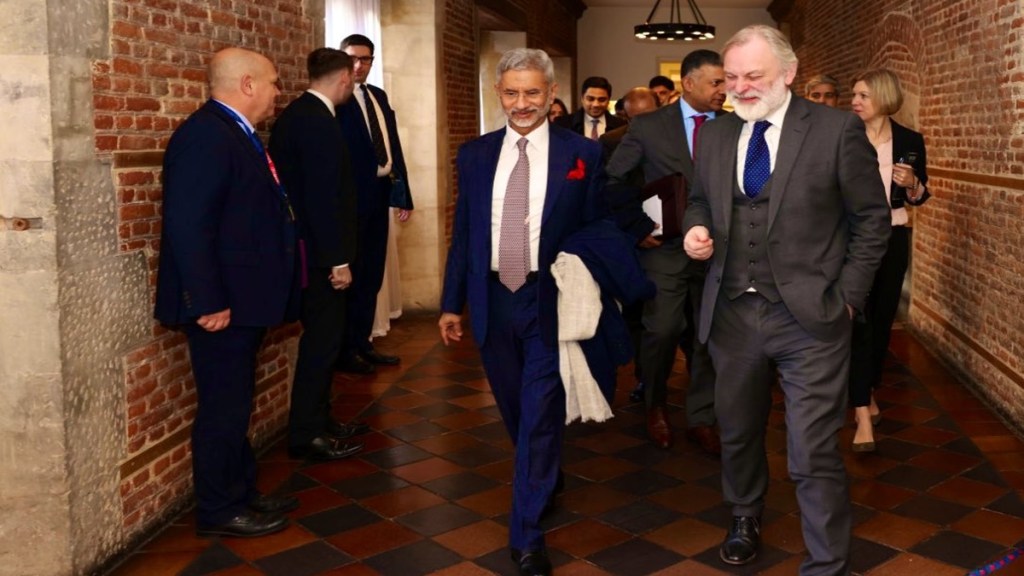External Affairs Minister S Jaishankar concluded his five-day diplomatic mission to the UK with a strategic touch, deeming it a timely engagement marked by cross-party dialogues and substantial advancements in the ongoing free trade agreement negotiations. The extensive discussions held with UK Cabinet ministers and Opposition leaders covered a spectrum of global and bilateral issues, reinforcing the enduring historical ties between the two nations.
The visit served to bolster the existing India-UK Comprehensive Strategic Partnership and provided a renewed impetus to bilateral cooperation across diverse areas, set against the backdrop of progress on the Roadmap 2030. The expressed satisfaction of Prime Minister Rishi Sunak and Jaishankar underscored the positive momentum in enhancing the India-UK relationship as a crucial factor in addressing contemporary challenges.
Integral to the discussions was the review of the Roadmap 2030 implementation and deliberations on the ongoing negotiations for an India-UK Free Trade Agreement (FTA). The talks also delved into India’s concerns regarding pro-Khalistan extremism, particularly in relation to the safety of its diplomats. Meetings with UK Home Secretary James Cleverly and National Security Adviser Tim Barrow provided a platform to address these concerns.
In a media interaction in London, the minister elucidated on India’s longstanding concerns about extremist activities, cautioning against the misuse of freedom of expression. The gravity of the situation, highlighted by violent protests at India House in March, urged Jaishankar to articulate India’s expectations regarding the safety of its diplomatic mission and a firm stance against the advocacy of violence and extremism.
Regarding the India-UK Free Trade Agreement, Jaishankar acknowledged the substantial progress achieved. However, he refrained from predicting the finalization of negotiations, emphasizing the intricate nature of the process. As the first minister to engage in bilateral talks with newly appointed UK Foreign Secretary David Cameron, he navigated discussions on a range of regional issues, including the Russia-Ukraine conflict and the Israel-Hamas conflict in West Asia.
The bilateral talks unfolded avenues to harness the full potential of the India-UK partnership across political, economic, and trade realms. Cooperation in defense and security, science and technology, innovation, health, education, and people-to-people connections took center stage. A noteworthy exchange occurred with David Cameron presenting Jaishankar with a cricket bat signed by both England and Indian cricket teams, a symbolic gesture accentuating the significance of cultural ties.
The bipartisan nature of the bilateral relationship was underscored by the minister, reflecting on extensive discussions with Opposition Labour Party Leader Keir Starmer and Shadow Foreign Secretary David Lammy. The multifaceted approach of the visit encapsulated engagements ranging from high-level political discussions to interactions with the Indian diaspora, symbolizing the comprehensive nature of India-UK ties.
The intricate fabric of discussions extended to an in-conversation session organized by Wilton Park at the Royal Over-Seas League in London. Jaishankar covered a broad spectrum of topics, including the momentum behind India’s growth story, the realities of relations with China, and the emergence of a more authentic India.
Engagements with UK officials, including Home Secretary Cleverly and Defence Secretary Shapps, focused on the significance of mobility in skills and talent, as well as defense and security cooperation. The discussions aimed to address shared concerns, including extremism and trans-border crimes. His meeting with NSA Sir Tim Barrow delved into recent developments in West Asia, Indo-Pacific, and the Russia-Ukraine conflict, highlighting the need for close collaboration on combating violent extremism and radicalism.
Meetings with former UK Prime Minister Tony Blair, Leader of the Opposition Keir Starmer, Shadow Foreign Secretary David Lammy, and Shadow Minister of State for Asia & the Pacific, Ms. Catherine West, emphasized the nuanced and dynamic nature of diplomatic engagements.
The visit’s cultural dimension unfolded at a Diwali Reception at Westminster Palace, where Jaishankar addressed the Indian diaspora. Additionally, a visit to the BAPS Swaminarayan Temple in Neasden included the unveiling of two 8th Century Yogini sculptures from Uttar Pradesh, underscoring the shared cultural heritage between the two nations.
A high point was Jaishankar’s participation in a conversation on ‘How a Billion People See the World’ at a Policy Event held in partnership with Wilton Park and the Royal Overseas League. Moderated by eminent political commentator Lionel Barber, the event drew parliamentarians, diplomats, journalists, academicians, and business leaders, providing a comprehensive perspective on the diplomatic endeavors.
In essence, S Jaishankar’s diplomatic endeavor in the UK emerged as a strategic and meticulous effort to strengthen India-UK ties amid the intricate dynamics of the contemporary global landscape. The visit not only reinforced historical connections but also navigated diverse challenges, underscoring the multifaceted nature of the bilateral relations

